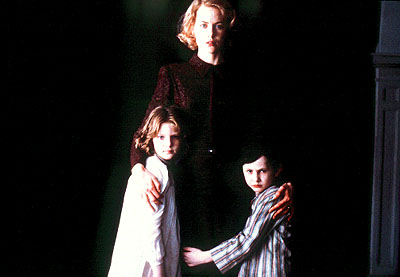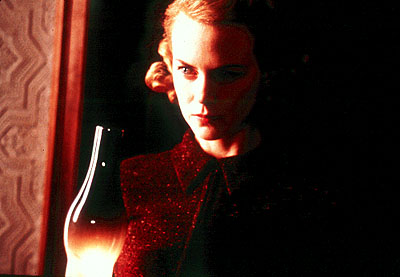

The Others gives American audiences their first 'real' chance of seeing Spanish director Alejandro Amenabar in action. His last film, Open Your Eyes, was a wonderfully confusing story, not clearing up until the very end. Unfortunately, since it was in Spanish, it played mainly in art house theaters. Tom Cruise enjoyed the film so much he bought the right to remake it as the upcoming Vanilla Sky. He also agreed to finance this film, Amenabar's first English language film, and his then wife Nicole Kidman agreed to star. The result is a horror film unlike most horror films out there. Amenabar (Snuff) is a master at establishing mood, leaving most of the horror off screen. Instead of the typical blood and guts, much of the feeling is psychological. As with Open Your Eyes, there is an O. Henry-like twist at the end, that is at times hard to figure out although people know it's coming.
Grace (Kidman, Moulin Rouge, Eyes Wide Shut) lives alone with her children in a huge, ominous house. Her servants recently disappeared for no reason, and she is anxiously awaiting the return of her husband from World War II. The war ended a while ago, but she steadfastly refuses to believe that he is dead, despite all the circumstantial evidence otherwise. Her children, Anne (Alakina Mann) and Nicholas (James Bentley) have a disorder where any contact with bright light can potentially cause death. As a result, when the children are around, all the windows are shut and the only light is that of candles. There is no electricity, and Grace hates any sort of noise. Three new servants appear, seemingly out of nowhere. Bertha Mills (Fionnula Flanagan, Deceit, Waking Ned Devine), Edmund Tuttle (Eric Sykes, Gormeghast, The Unforgettable Hattie Jacques), and Lydia (Elaine Cassidy, Felicia's Journey, Disco Pigs) are mysterious, have their own agendas, and never fully answer Grace's questions.
In this foreboding house, Anne, Nicholas and Grace begin to hear noises. Anne says that there is another family living there, and the family claims the house belongs to them. Grace will not believe any such nonsense. Amenabar portrays Grace as a protective mother, almost paranoid at times for the safety of her children. So are the noises she hears real or just imagined? They could just be the house shifting its weight, or they could be the servants moving around. When the events begin Amenabar has them start slowly and sporadically. At first, they could be anything. He slowly escalates the action, increasing the tension and Grace's histrionics. Kidman's performance is riveting. She shines in her portrayal of Grace, especially when she begins to realize that something out of the ordinary may be happening. Grace refuses to reconcile the supernatural with her religious upbringing, and Kidman's vocal inflections, mannerisms, and delivery fully reflect the turmoil Grace is suffering.
It is also to The Others' benefit that Amenabar refrains from the temptation to assault the viewer with gore. By taking his time and baiting people slowly with tantalizing glimpses of what may be, the full effect of presenting something on screen later in the movie is greater. It allows the people watching the movie to imagine the horror in their head, something much scarier than watching it splash across the screen. In order to correctly do this, Amenabar uses his actors and settings to their utmost. A dense fog perpetually surrounds the house. The servants are creepy, and it's unclear whether Grace herself is insane or not. The children's illness is also a convenient excuse to drape every room in darkness, casting huge, dark shadows on the walls. Amenabar successfully creates a creepy environment, and most importantly, does not falter at the end like so many other movies in the genre.